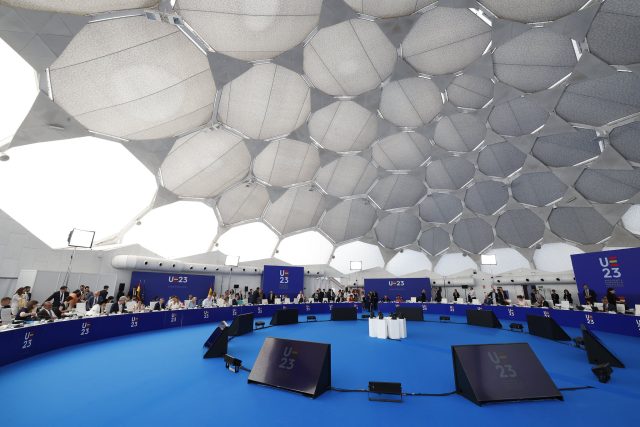
The historic Spanish city of Valladolid hosted an informal meeting with the ministers of Environment and Energy of the European Union (EU). Valladolid is one of Spain’s and Europe hubs of renewable energy production.
Valladolid’s was one of the first ministerial level gatherings of the Spanish Presidency of the Council of the EU. The Spanish Vice President and Minister for Ecological Transition and Demographic Challenge, Teresa Ribera chaired the two-day event. In addition to the EU Ministers, Spain invited its Norwegian, Icelandic, and Swiss counterparts. Frans Timmermans, the vice president of the European Commission, also travelled to Valladolid.
The meeting was not without its share of controversy. Ribera, from the Spanish Socialist Party (S&D) travelled from Madrid in a private aircraft. When the Vice President arrived in Valladolid she moved to the venue in a limousine, escorted by two security vehicles. Some 10 minutes before her arrival, when journalists and cameras started to congregate, she ditched the limo for a bike. The political gimmick backfired. Ribera is now being criticized for her attempt at greenwashing her arrival.
The ministers discussed about “the need to strengthen the value chain and guarantee security of supply in the energy sector.” They also addressed “the challenges of achieving an integrated and digitised internal energy market.” The meeting, however, ended with no resolution or concrete plan to meet Europe’s energy demand and secure its energy independence, though there was expectation for what was brewing in Strasbourg.
During the last hours of the meeting, the European Parliament approved the Commission’s Nature Restoration Law with 336 votes in favor, 300 against and 13 abstentions. This regulation calls on Member States to “take account of the potential for renewable energy projects to make contributions towards meeting nature restoration objectives.” The conservative bloc voted against the Commission’s proposal.
One of the Spanish Presidency’s priorities is to “advance in the green transition and the environmental adaptation.” It envisions reducing Europe’s dependence on energy while promoting a “fair transition.”
The passing of the Nature Restoration Law in the EP is certainly a win for the Spanish Presidency. However, critics in the ECR and the EPP Groups claim the Law would reduce Europe’s energy output. They say it could also hurt the primary sector due to the massive reductions in farmland included in its provisions.
With conflict escalating in the East, and when the “strategic autonomy” discourse dominates much of the current European political landscape, measures like the Nature Restoration Law may reduce the EU’s geopolitical standing. This and other EU Green Deal packages accelerate an ecological transition process that should be gradually implemented in accordance with the EU’s short-term priorities. Two of them are increasing EU influence and reducing its dependence on foreign sources of energy. Those goals can hardly be met if the Union risks reducing its energy production capacity. The proposal will now move to an amendment procedure, but it will hardly reverse the most potentially damaging parts of its text.
Spain summoned the Environment and Energy Ministers to Valladolid in a crisis context. According to the International Atomic Energy Agency (IAEA), the rapid economic recovery from the COVID-19 pandemic and Russia’s aggression against Ukraine made the price of gas and other sources of energy soar.
“Higher energy prices have contributed to painfully high inflation, pushed families into poverty, forced some factories to curtail output or even shut down, and slowed economic growth to the point that some countries are heading towards severe recession”. The Vienna-based international organization describes this crisis as the first one that is “truly global” in scope.
Europe must lead the ecological transition. Innovation and investment in renewables are crucial. But that transition should not come at the expense of rural communities and the geopolitical standing of the EU.



 Subscribe
Subscribe